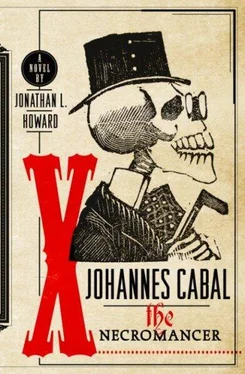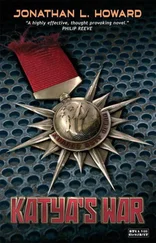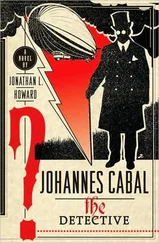“The arcade? About time that place earned its keep.” Cabal strode off with Bones at his heel.
Horst blurred and was there before them.
The penny arcade had consistently proved a good attraction to people wanting to get rid of spare change but had performed badly in the soul-reaping stakes. Now, as always, it was packed with children and teenagers playing the bagatelle boards and one-armed bandits, testing their strength against a brass arm, and watching the macabre events of the penny tableaux. Horst looked around frantically. They would arrive soon, and he would have lost his chance to get the prospective victim out of here. Impeded by bodies, he was unable to move at high speed and was forced to push politely through the throng. He couldn’t see anybody who fitted the bill until, finally, a mob of pubescents gave up trying to win fluffy toys from the crane machine and moved away. She was young, probably not even twenty, and Horst had rarely seen such an expression of ingrained misery. Here she was surrounded but untouched by people, her unhappiness a tangible thing that must have seemed to her almost deliberately ignored by others. Horst moved firmly through the mass.
“Excuse me, madam.” He was at her elbow. She looked up. Too many nights without sleep. Too many nights crying. He looked towards the entrance. He could see his brother and Bones approaching. He didn’t have enough time for subtlety or even just to mesmerise and steer her out of there. “You seem unhappy. May I be of assistance?” She just smiled wanly, uncertain. “I am Horst Cabal, one of the proprietors. It pains me to see one of…” Cabal and Bones were almost at the entrance. “Look, what’s wrong? Can it be fixed with money? We’ve got more money than we know what to do with. I can give you as much as you need.” Her smile faded, and she just looked confused. He had no more time. He leaned forward and whispered in her ear. “Whatever you do, do not give in to temptation. Promise me!” He leaned back to find her looking at him un-comprehendingly “Don’t give in,” he hissed, and moved away.
Cabal looked around the arcade. There were any number of women who might have been either miserable or just fashionably inexpressive. Any knack for spotting misery that he may have once possessed had long since atrophied through lack of use. “Who?” he asked Bones.
“That one, boss. She’s got a face longer than a wet day.”
Cabal studied her. She looked a little baffled to him, frankly. “So what does she want?”
Bones shrugged ineloquently. “I don’t know.”
Cabal sighed with exasperation and tried to remember how the arcade worked. The sideshows were so much easier. There you could just ask. He looked around for somebody to ask here, and his eye fell upon the mechanical fortune-teller. Inside her glass case, Madame Destiny promised to tell the gullible punters their fortune, printed on a small piece of card, and all for a single penny of the realm. She’d proved useful in the past, he recalled. Perhaps again?
Cabal walked over to it and surreptitiously struck the case with the base of his fist by the coin slot. Nothing happened. “Stump up, Destiny, or it’s a rendezvous with a hacksaw for you,” he whispered harshly.
The mannequin in the case immediately whirred into life, obligingly looked into her crystal ball, and stopped. A moment later, a card fell into the tray. Cabal took it and read:
MADAME DESTINY KNOWS ALL AND SEES ALL.
YOU WILL MEET A WOMAN WHO HAS WHAT SHE DOES NOT WANT.
GIVE HER A SOLUTION AND SHE WILL BE GENEROUS.
MADAME DESTINY’S ADVICE:
MANNERS MAKETH THE MAN.
Cabal read it through twice before crumpling it up. He leaned close to the front of the cabinet, as if putting a coin in. “That is precisely no help to me,” he whispered. “What does she have that she doesn’t want? A disease? Lice? A distinctive and irritating laugh? Give me specifics and save the meaningless generalities for the rubes.” To the imaginative, the mannequin might have seemed to purse its lips. Certainly it ran through its little fortune-telling dumb show at an undignified gallop. The card spat into the tray with so much venom that Cabal had to stop it before it fell to the ground. This one read:
OKAY, OKAY.
MADAME DESTINY ETC.
THAT WOMAN HAS A BABY WHO’S DRIVING HER CRAZY.
WON’T STOP HOWLING. NO HUSBAND.
HER MOTHER’S LOOKING AFTER IT TONIGHT.
GIVE HER AN OUT AND SHE’lL GIVE YOU HER SOUL. EASY.
MADAME DESTINY’S ADVICE:
TRY SAYING “PLEASE” IN FUTURE, YOU ARSEHOLE.
With the exception of the advice, it was exactly the kind of news Cabal had been hoping for. “Bones, I want this arcade evacuated, with the exception of that woman.”
“Sure thing,” said Bones, and moved quietly and surreptitiously around, handing out free ride tickets to all and sundry. Within five minutes, the arcade contained only Cabal and the woman, who was slowly feeding coins into a fruit machine called Fun Time. Or so it seemed to Johannes Cabal, unaware of a figure in the corner who had forced himself into near transparency. Horst Cabal watched and hoped.
In the row of penny tableaux was one covered with a tarpaulin and an Out of Order sign on the front. In truth, the Cabal brothers had run out of ideas by the time they’d got to that one, so it was actually empty. Now Johannes approached it, concentrated, mouthed, “I invoke thee,” and pulled the tarpaulin away. Inside the cabinet was a tableau of a room. Within it was a tiny automaton that looked strikingly like the young unhappy woman. The room was a tiny squalid bed-sit with laundry hanging from lines strung over a bath visible through an ajar door. The automaton stood by a cradle in which a tiny doll of a baby lay. Small it may have been, but, somehow, there was enough detail to make it clear that this was a child it would be hard for anybody to love. The tableau was entitled “The Mother’s Escape.” Folding the tarpaulin over his arm, Cabal walked to the far side of the arcade and pretended to be in conversation with the old man in the change booth. In reality, he watched the woman. Nor was he the only one.
The young woman was disappointed when Fun Time started to hand lemons out with harsh regularity. Soon she was short of coins, and the reversal of fortune had depressed her. She left the machine and walked the ranks of its comrades. She would have to be heading for home before long, she knew, and wanted some small piece of pleasure to bide her through the night. She saw the row of penny tableaux and inspected them one by one. They were all horrible: tales of murder and execution, hauntings, and harsh justice. Nothing that she wanted to know. She was about to leave them when her eye fell upon the last in the row. Whether it was the title, or the striking resemblance the automaton bore to her, or the tableau to her own bed-sit, neither Cabal could tell, but it drew her inexorably.
She stopped by the case and looked into it. It was strange, dreamlike. It was as if somebody had taken her life, re-created it in wood, wire, and paint, and put it here, on public display. On slips of paper — aged and yellow despite in truth being less than ten minutes old — were written “The Unhappy Mother” and “The Troublesome Baby,” pinned to the tableau’s floor in front of their respective subjects. Her eyes prickled. She wasn’t alone after all. Somebody else must have suffered as she suffered for the story to be retold here. As she fumbled for one of her few remaining coins, another pair of eyes nearby prickled, grew moist, and silently wept.
She had to know, she had to see how this other person had fared. The tableau was after all “The Mother’s Escape.” How? How had she escaped? She needed to know with a strange urgency. She put the coin to the slot and dropped it inside.
Читать дальше










